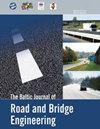Measurement of Temperature Distribution Within Steel Box Girder of Vistula River Bridge in Central Europe
IF 1.1
4区 工程技术
Q4 ENGINEERING, CIVIL
引用次数: 3
Abstract
Uneven temperature distribution in a structural element constitutes one of its load factors. Temperature fields occurring in structural elements lead to stresses and strains. The values of internal stresses are directly related to temperature distribution and degree of freedom for element deformation. The best way to get information about temperature distribution in an element is to take measurements on a real object. Such measurements have been run or are still taken over decades in various parts of the world, e.g. in Western Europe, USA, China, South America. In a number of cases, such examinations were carried out for objects constructed in warm or hot climate. It is a lot harder to find the results of measurements made in the countries with moderate and transitional climate, like in the Central or East-Central Europe. This paper presents measurement methodology and results gained for a large steel bridge located in the East European Plain, about 52.5° N northern latitude. Permanently installed contact sensors, temporary sensors, as well as pyrometry and thermography were used. An attempt was made to determine temperature distribution in a steel box girder of a bridge using thermovision technique. Approximate temperature distribution patterns in the main span girder were determined from thermal photographs taken. The most important results of examinations are the images of temperature fields in the main span girder related to solar radiation that first and foremost directly affects the bridge deck.中欧维斯瓦河大桥钢箱梁内温度分布的测量
结构元件中不均匀的温度分布构成了其荷载因素之一。结构元件中出现的温度场会导致应力和应变。内部应力的值与温度分布和元件变形的自由度直接相关。获取元件中温度分布信息的最佳方法是对真实物体进行测量。几十年来,这种测量已经在世界各地进行或仍在进行,例如在西欧、美国、中国、南美。在许多情况下,对在温暖或炎热气候下建造的物体进行了此类检查。在气候温和和过渡的国家,如中欧或中东欧,要找到测量结果要困难得多。本文介绍了位于北纬52.5°N的东欧平原上的一座大型钢桥的测量方法和结果。使用了永久安装的接触式传感器、临时传感器以及高温计和热成像。尝试用热视觉技术测定某桥梁钢箱梁的温度分布。根据拍摄的热照片确定了主跨梁的近似温度分布模式。最重要的检查结果是与太阳辐射相关的主跨梁温度场图像,太阳辐射首先直接影响桥面。
本文章由计算机程序翻译,如有差异,请以英文原文为准。
求助全文
约1分钟内获得全文
求助全文
来源期刊
CiteScore
2.10
自引率
9.10%
发文量
25
审稿时长
>12 weeks
期刊介绍:
THE JOURNAL IS DESIGNED FOR PUBLISHING PAPERS CONCERNING THE FOLLOWING AREAS OF RESEARCH:
road and bridge research and design,
road construction materials and technologies,
bridge construction materials and technologies,
road and bridge repair,
road and bridge maintenance,
traffic safety,
road and bridge information technologies,
environmental issues,
road climatology,
low-volume roads,
normative documentation,
quality management and assurance,
road infrastructure and its assessment,
asset management,
road and bridge construction financing,
specialist pre-service and in-service training;

 求助内容:
求助内容: 应助结果提醒方式:
应助结果提醒方式:


